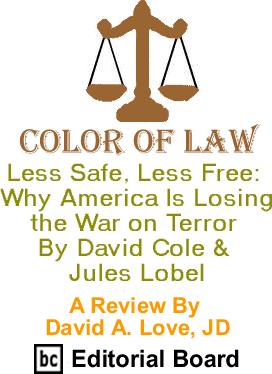
|
|||||||||||||||||||||
 |
|||||||||||||||||||||
|
||||||||||
 |
||||||||||
|
||||||||||
The current issue is always free to everyone If
you need the access available to a |
||||||||||
 |
||||||||||
In George Orwell’s novel 1984, the superpower state of Oceania — a totalitarian regime marked by the constant surveillance of its people — is in a state of perpetual war with Eurasia and Eastasia. Big Brother, the leader of Oceania’s repressive regime, tells his citizens that the nation is better than its enemies, which at any given time may be Eurasia, or Eastasia, or both, and that it is winning the war against its rivals. Meanwhile, the people of Oceania really do not know for certain that Oceania is winning the war, or that the war actually exists, or even that Eurasia and Eastasia actually exist.
America’s so-called war on terror reminds me of this Orwellian concept of perpetual war. One can make the argument that both are used to manipulate the citizenry through secrecy and coercion, justify a waste of precious resources, and rationalize the purging of basic civil liberties. A new book by Georgetown law professor, David Cole, and University of Pittsburgh law professor and Center for Constitutional Rights, vice president Jules Lobel, provides a critique of America’s post-9/11 war on terror. Less Safe, Less Free: Why America Is Losing the War on Terror (The New Press, 326 pp.) suggests that this war has been an abysmal failure. The authors focus their attention on the cornerstone of the Bush administration’s antiterrorism efforts, the preventive paradigm. Under the preventive paradigm, nations are attacked and suspects are kidnapped, tortured, detained and prosecuted, not based upon what they have done, but on what they could do in the future. Under this warped logic, the usual cost and benefit analysis is eschewed on the grounds that the stakes are too catastrophic. In other words, as its proponents would argue, we must do whatever is necessary in order to prevent deadly terrorist attacks and fight the people who commit them. Decisions to take action are the result of a warped calculation based on hunches, driven by suspicion and hysteria, and rife with abuse. But perhaps the most troubling aspect of the preventive paradigm is its disdain for the rule of law. The legal process, both domestic and international, is viewed not merely as passé and an inconvenience, but a strategy for the weak and an anathema. Americans are subjected to illegal wiretaps. People are held indefinitely, based on questionable evidence, evidence obtained through torture, or no evidence at all. They are deemed terrorists because they have a certain political or religious affiliation, or belong to a certain racial or ethnic group, or because the president says so. Supporters of the preventive paradigm cannot point to any successes as a justification for its coercive methods and the elimination of the rule of law. The vast majority of the detainees at Guantanamo (95 percent) are not members of the Taliban or al Qaeda, and draconian immigration reforms have not unearthed a single terrorist. And almost no terrorists have been brought to justice. However, this misguided strategy has cost the lives of countless thousands in Iraq, thwarted legitimate antiterrorism efforts, and encouraged the spread of more terrorism. The international community distrusts the United States, and the Muslim world resents and hates America for its interventionism and aggression in the Mideast, and justifiably so. Meanwhile, as America embraces antidemocratic principles in the war on terror, it provides cover to other repressive regimes who wish to do the same. The authors propose constructive solutions to undoing the harm created by preventive war, including the respect for the rule of law and international human rights legal principles within U.S. borders, the elimination of overseas military bases, the use of diplomacy rather than war and coercion, and international cooperation. Further, the authors call for the U.S. to embrace the International Criminal Court, which Bush has sought to undermine by not participating in it, and seeking to make American citizens immune from prosecution. Professors Cole and Lobel perform a valuable service by deconstructing and demystifying one of the most deplorable chapters in American history, as it is occurring, and suggesting positive solutions. Less Safe, Less Free is required reading for critics of the war on terror and the Iraq War, lovers of civil liberties and human rights, and those who are concerned about the monster this country has become. BlackCommentator.com Editorial Board member David A. Love, JD is a lawyer and prisoners’ rights advocate
based in Philadelphia, and a contributor to the Progressive
Media Project, McClatchy-Tribune
News Service and In These Times.
He contributed to the book, States
of Confinement: Policing, Detention, and Prisons |
||||||||||
| November
15 , 2007 Issue 253 |
|
| Printer Friendly Version in resizeable plain text format format |
 |
 |
 |
| |
| |






























